Chongqing’s "Test-oriented" Waste Classification: The pilot is easy to popularize, but it is difficult to face three "obstacles"
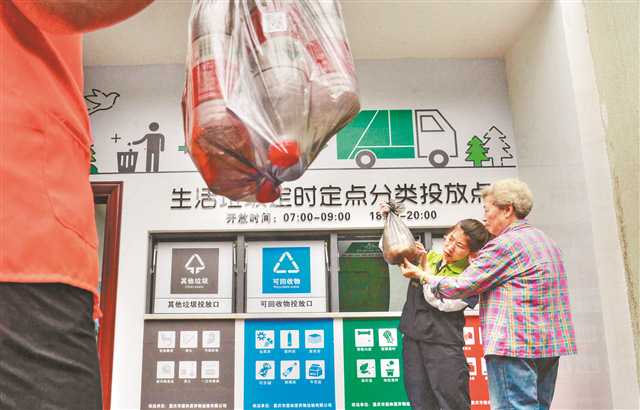
On June 12, at the fixed-point sorting and dropping point of domestic garbage in the steel ball community of Jiulongpo District, residents dropped garbage under the guidance of sorting garbage inspectors.

In the Steel Ball Community of Jiulongpo District, points can be exchanged for gifts by using bonus cards.
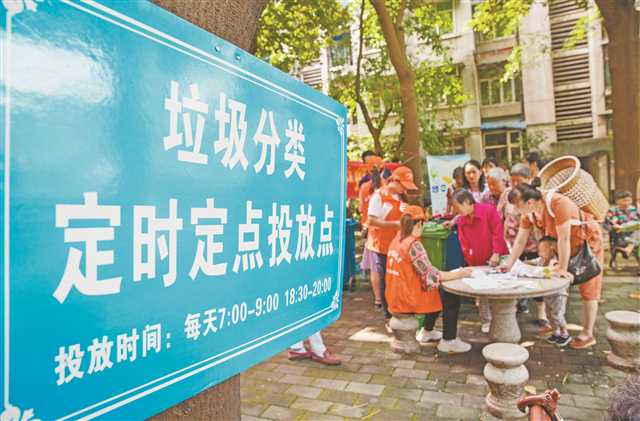
On July 10th, in Mei ‘an Community, Longfengqiao Street, Beibei District, the preacher was explaining the knowledge of garbage classification to the community residents. Correspondent Qin Tingfu photo
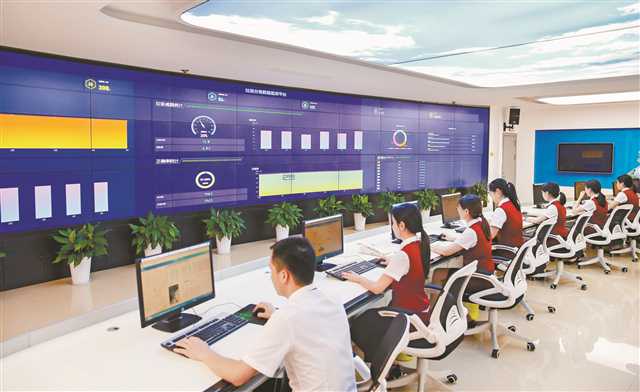
On June 10th, the smart platform for garbage sorting in Liangjiang New Area can monitor the correct delivery rate, points and other data in real time.
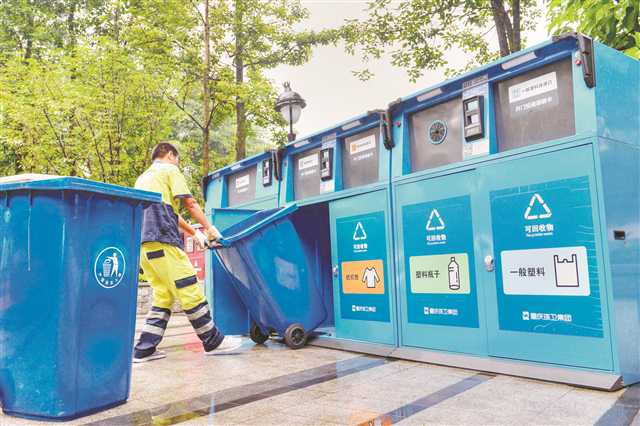
On June 12, in the Steel Ball Community of Jiulongpo District, the recycler was cleaning up the garbage in the recyclable smart box.
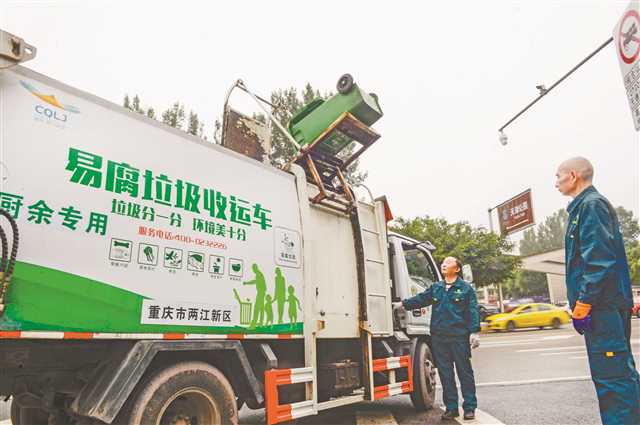
On June 18, in the community of Tianhumei Town, Renhe Street, Liangjiang New District, the staff were cleaning up perishable garbage.
All the pictures in this edition were taken by reporter Zhang Jinhui except the signature.
On July 1st, it was called the strictest garbage sorting measure in history — — With the implementation of "Regulations on the Management of Domestic Waste in Shanghai", garbage classification has become a hot word that has set off major websites and gossip in the country.
Shanghai’s promotion of waste sorting is real, and Chongqing’s waste sorting is also accelerating. At present, the garbage classification system in the main urban area of our city has covered more than 1.1 million households in 43 towns and 306 communities. The overall level of waste sorting in Chongqing is above the average in 46 key cities in China, and it is temporarily in the forefront in the west.
In 2020, Chongqing will carry out domestic waste classification demonstration in 50% of streets and towns and 30% of administrative villages in urban built-up areas.
Zhu Xinglong, general manager of Nanjing Zhida Environmental Protection Technology Co., Ltd., has often staged a "Tale of Two Cities" recently. At the end of June, he just attended the press conference that Zhida was selected as a gazelle enterprise in Nanjing in 2019, and flew to Liangjiang New District in Chongqing to learn about the company’s pilot waste sorting in Yuanyang Street and Dazhulin Street.
Zhu Xinglong is a "crab eater" in the field of garbage classification in Chongqing. In 2009, he established the first private garbage sorting and recycling station in our city — — Chongqing Hengao Environmental Protection Technology Development Co., Ltd. tried to classify garbage in the main city for 5 years, but the loss was more than 10 million yuan. In desperation, he moved to Nanjing and found business opportunities, and the company developed into a national garbage sorting enterprise.
In 2014, when Zhu Xinglong left Chongqing, there were less than 20,000 residents and less than 80,000 people in the main city of Chongqing. Today, the number of residents in the main city participating in the waste sorting pilot has expanded to more than 1.1 million households and millions of people.
From losing Chongqing to returning to Chongqing for gold digging, Zhu Xinglong, the "king of garbage", went back and forth, which reflected the change from "cold" to "hot" in the pilot garbage sorting in our city in the past 10 years.
In the past, garbage was exchanged, and now intelligent garbage collectors enter the community.
Zhu Xinglong still remembers it vividly: in 2009, when he tried to classify garbage in Jiulongpo District, he adopted the extensive classification method of garbage exchange — — Residents call, and the company’s garbage sorter comes to the door to sort, weigh, pay and take away the waste and send it to various resource recycling centers. In order to attract popularity, Zhu Xinglong also engages in some activities from time to time, such as changing mineral water bottles for eggs and changing waste newspapers for paper.
Ten years later, Chongqing’s garbage sorting method has become fine.
Recently, the reporter saw in the No.7 residential area in the Mid-Levels of Jiulongpo District that an intelligent garbage recycling system was set up in the residential area. The words "waste paper", "metal", "textiles" and "plastic bottles" were written on each collection box, and it was clear which window should be put in which kind of garbage.
"Every household has a smart card. As long as the garbage is put correctly, the card will get points." Wang Lanfang, a resident of No.7 residential area in Mid-Levels, said that one kilogram of cardboard is 100 points, and each plastic bottle is 4 points … … The community also has a point exchange machine like a vending machine, where residents can exchange towels, soap and other daily necessities.
Since the intelligent garbage collector entered No.7 Mid-Levels, the community has a garbage sorting instructor, and the accuracy of residents’ garbage sorting has increased to 82%. However, there are still many households who question whether the classified garbage will be mixed and transported.
This kind of worry is not unreasonable.
The Research Center for Environment and Economic Policy of the Ministry of Ecology and Environment has conducted a survey on the behavior of household garbage classification. Respondents think that "garbage is not classified when it is transported centrally, and there is no need to classify it", accounting for 59.6%; "I don’t know the progress and results of garbage disposal after classification, and I have no sense of accomplishment", accounting for 34.5%.
In response to these concerns of residents, Chongqing has made some efforts.
In the Steel Ball Community of Jiulongpo District, the reporter saw that the garbage bins in this community were regularly classified and placed at fixed points, indicating the collection and transportation time and transportation direction of each kind of garbage — —
Perishable garbage is collected and transported to Jiangbei Heishizi kitchen waste treatment plant from 9: 00 to 10: 00 every morning; Other garbage is collected and transported to the solid waste transfer center of Chendang Road from 9: 00 to 11: 00 every morning, compressed and then sent to the garbage incineration power plant; Recyclable materials are collected and transported from 2: 00 pm to 5: 00 pm every day and transported to Chendang Road Solid Waste Transfer Center; Harmful waste, it is collected and shipped once a month.
"The Sanitation Group is equipped with 520 sanitation transport vehicles, and each type of collection and transportation vehicle can only collect and transport its corresponding garbage type, and there is video surveillance throughout the transportation." He Yongquan, chief engineer of Environmental Sanitation Group, introduced that the Group has also installed a life cycle management system for waste sorting in some communities. Tap this intelligent system and enter the corresponding garbage classification card number, so residents can know the detailed information of garbage loading time, transportation and treatment.
The pilot is easy to popularize, but it is difficult to classify waste in Chongqing. There are three obstacles.
In China, it is easy to pilot waste sorting, but it is difficult to promote it continuously, and Chongqing is no exception.
Many people in the industry believe that the residents’ participation rate needs to be improved, the collection and transportation system is not perfect enough, and the classification and disposal are not thorough enough, which are the three "obstacles" in the process of garbage classification and promotion in our city.
"The most difficult thing to break through in garbage classification is the source classification of residents." Zhu Xinglong said that the company used the big data system to analyze the characteristics of people involved in garbage sorting, and found that 70% of residents were over 60 years old, and 10% were middle-aged people around 40 years old.
Not only that, tens of thousands of smart garbage collectors are not available in every community. For example, there are more than 60,000 pilot households in Yuzhong District, and only about 10 sets of smart garbage collectors are installed.
"It is a technical job to divide hundreds of kinds of garbage into recyclables, perishable garbage, other garbage and harmful waste." Mr. Zhang, who lives in Ranjiaba, said that he noticed that Chongqing has not yet developed an App or program to help residents sort garbage.
The difficulty of garbage sorting in Chongqing also stems from the terrain limitations of mountain cities.
According to an industry insider, many cities in China have launched the action of "withdrawing barrels", thus forcing citizens to develop good classification habits. There are many high-rise buildings in Chongqing, and citizens are not used to throwing garbage downstairs. It is unrealistic to carry out a large-scale "barrel withdrawal" operation.
A set of data also confirms the problem of insufficient coverage of garbage classification in our city.
At present, the proportion of households covered by the pilot project of domestic waste classification in the main city is 23.58%, which is lower than the average proportion of households participating in waste classification in 46 key cities determined by the state, which is 38.3%.
In addition to the front-end classified delivery link, Chongqing is also facing confusion in the back-end classified collection, classified transportation and classified disposal.
Integrating the classified collection and transportation system of garbage with the recycling system of renewable resources is conducive to improving the efficiency of classified collection and transportation of domestic garbage and resource utilization. However, Fu Yuechao, a researcher at the Development Research Center of the municipal government, found that high-value waste products such as copper, aluminum and cartons are "fragrant cakes", and enterprises are scrambling to collect them, but waste furniture, foam, glass bottles, milk boxes and batteries are neglected. "Cleaning glass and milk cartons is troublesome, which increases the recycling cost. Recycling batteries, medicines and other harmful waste, enterprises need qualifications, and it is difficult for ordinary enterprises to take over. "
Another phenomenon that can’t be ignored is that although Chongqing is in the forefront of the country in terms of waste incineration power generation and kitchen waste treatment, with an average daily treatment of about 2,000 tons of kitchen waste and more than 8,000 tons of waste incineration power generation, harmful waste’s disposal is still a "short board".
According to the information provided by the Municipal Bureau of Ecology and Environment, there are currently 63 hazardous waste management units in the city, with the utilization and disposal capacity of 1.345 million tons/year. The demand and capacity of hazardous waste disposal in the city have not been completely matched, and the collection, transportation and transit storage facilities and equipment in harmful waste need to be further supplemented and improved.
43 towns and streets carried out pilot projects to incorporate garbage classification into urban management target assessment.
With the drastic measures of garbage sorting in Shanghai, all major cities in China are "smelling garbage and dancing", and Chongqing is also actively preparing for the test of garbage sorting.
"This year, there are 43 streets and towns in the main city to pilot waste sorting, accounting for 47% of the total number of streets and towns." According to a person from the Municipal Urban Management Bureau, in order to promote the garbage sorting work, the city implemented the "Measures for the Management of Domestic Waste Classification in Chongqing" in January this year, requiring transport units to refuse to transport if they find that the delivery and collection of domestic waste do not meet the classification requirements and refuse to rectify.
At the same time, the city has established a system of "monthly dark investigation, quarterly evaluation", "monthly report and quarterly notification", and each district in the main city has a classification work leading group or joint meeting system. The Municipal Urban Management Bureau also conducts unannounced visits and special law enforcement actions from time to time, and incorporates garbage classification into the evaluation content of urban management objectives.
In order to guide more people to participate in garbage sorting, the city has established a "four-level" instructor system for cities, districts, towns and communities, organized activities such as "municipal demonstration of youth volunteer service" and "hands-on" in garbage sorting, and compiled and printed a classification knowledge reader for children, primary schools and middle schools.
Many departments in Chongqing are engaged in the craze of garbage sorting — —
The Municipal Development and Reform Commission supports the construction of PPP projects in the field of waste sorting, and actively builds an investment and financing pattern of "government-led, market-driven and diversified investment";
City, District Housing and Urban-Rural Construction Committee will incorporate the classification of domestic waste into the supervision and inspection of property enterprises, and urge property enterprises to implement waste classification;
The Municipal Bureau of Ecology and Environment strives to build (rebuild and expand) five hazardous waste centralized incineration and landfill projects and seven medical waste disposal projects in 2020, and add more than 11,300 tons of medical waste centralized disposal, basically realizing the matching of hazardous waste disposal demand and capacity in the city;
The Municipal Commission of Commerce will accelerate the "two-network integration" of the renewable resource recycling system and the domestic waste classification collection and transportation system, and strive for each waste classification and recycling demonstration site to have renewable resource recycling enterprises to recycle in time.
At the same time, a number of "short-board" sanitation infrastructure projects are also being promoted. As soon as the end of this year, Xiajiaba large-scale garbage secondary transfer station in Yubei District will be put into use. By then, the total transfer scale of the three major domestic garbage secondary transfer stations in the main city (the other two are Zouma in Jiulongpo District and Jieshi in Banan District) can reach 9,600 tons/day. Our city is building the largest and most comprehensive waste sorting and utilization industrial park in Yubei — — Luoqi Vein Industrial Park, covering an area of about 5,000 mu, can treat kitchen waste, fruit and vegetable waste, building waste and general industrial waste at the same time after it is put into use in 2020.
How to push experts to make suggestions on garbage classification
Zhu Dajian, Director of Institute of Sustainable Development and Management, Tongji University:
In the past, garbage sorting was often carried out by the sanitation department alone, but now it needs to be coordinated. The responsibility of individuals and units should be clarified through legislation, and the garbage classification should be changed from government solo to social chorus.
Fu Yuechao, researcher of Chongqing Municipal Government Development Research Center:
Without a prosperous industrial ecology of garbage sorting, it is difficult for garbage sorting to become a reality from ideas, regulations and requirements. We should fully consider the reality of garbage collection and transportation in China and build an industrial chain from classified delivery to collection, transportation, disposal and use, and policy support should cover the whole industrial chain. For example, cities such as Nanjing subsidize the recycling of low-value waste such as glass, and Chongqing should speed up the introduction of policies to subsidize the recycling of low-value waste.
Professor Liu Guotao, School of Urban Construction and Environmental Engineering, Chongqing University:
Many people think that garbage sorting is low in science and technology, which is a misunderstanding. Big data and Internet of Things technologies can be applied to the field of garbage classification. Enterprises’ participation in waste sorting may not be profitable in the short term, which requires the government to provide supporting policies to encourage enterprises to apply scientific and technological achievements to waste sorting.
It should be noted that garbage sorting should also be promoted from the source. At present, Shenzhen encourages enterprises to simplify the packaging of goods and raise the threshold for disposable goods to enter the market. These practices are worth learning from Chongqing.
Reporter’s Notes "
Fight the "tough battle" of garbage sorting
Liao Xuemei Cui Yao
Garbage classification is the embodiment of a city’s civilization. After the early promotion pilot, many citizens realized the importance of garbage sorting. The reporter believes that garbage sorting is not only a protracted war, but also a tough battle, and we must not take it lightly.
Practice has proved that it takes time to change residents’ consciousness and living habits. From the experience of Japan and Taiwan Province, it will take about 20 years to reach the consensus of more than 90% people on garbage classification. Only by publicizing the knowledge of garbage classification in schools and units in a down-to-earth manner and doing a good job in the pilot of each street and each community can the trickle flow into the sea.
Winning the tough battle of garbage sorting requires the joint efforts of the government, enterprises and citizens. First of all, citizens should establish a sense of classification, and let garbage classification education enter the campus and the community, and cultivate all parties to develop the habit of garbage classification; Secondly, the government should actively explore ways to use the government to purchase services, give preferential treatment to taxes and fees, give priority to purchasing recycled products, and introduce social capital and strength to actively participate; In addition, it is necessary to establish a long-term mechanism for garbage classification through legislation and compulsory means. In this way, the idea that garbage classification is a new fashion can be deeply rooted in people’s hearts, and more enterprises can join the craze of garbage disposal.